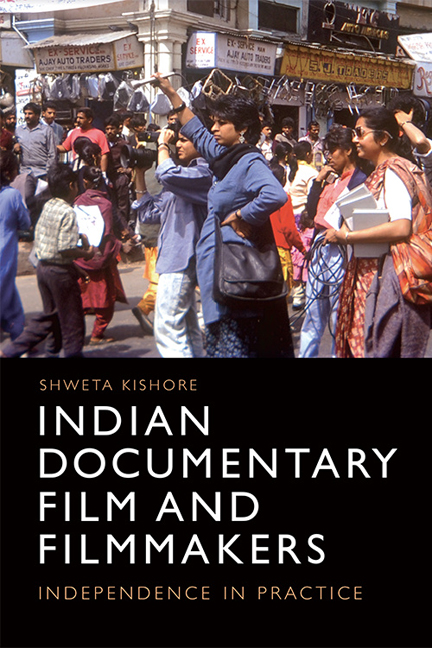1 - Histories and Cultures: Space, Filmmaker, Text, Spectator
Published online by Cambridge University Press: 24 April 2021
Summary
The heterogeneous practice of independent Indian documentary is scarcely amenable to the construction of a systematised historical narrative and therefore in this chapter I take a conceptual approach to identify positions and debates integral to the formulation of its central concerns, beliefs and idioms. I specifically focus upon its dialectical relation with discourses of art and media, and social and political institutions during the formative decades of the 1980s and 1990s. Heterogeneity or diversity is perhaps the operative concept here, for in this historical analysis, documentary film is both a semiotic project, a site of cultural critique as well as a form of representative social communication. Patently the practice critiques mainstream media representation and the narrowness of public debate but there also exists a relation of reflexivity within its practices and discourse that encourages a recurring mode of self-awareness and critique. The presence of reflexivity prevents independent Indian documentary from acquiring a generic character concerned merely with reproduction, multiplication and output, to instead remain attentive to considerations and debates around its identity, symbols, meanings and relations in society.
As an artistic undertaking, even as documentary may perform diverse functions and attract various forms of valuation, it contains the grounds for a distinctly ‘reflexive practice’, understood as one in which the artist and subject not only comprehend a depicted world but reflect upon their historical and social position in the world (Feige 2010: 134). Focusing on the concept of reflexivity allows for a conceptualisation of independent documentary as a set of practices whose form and politics are in a state of critical dialogue with society and its own histories and canons, rather than a free-standing mode contained within a rigid oppositional horizon. In a foundational essay, Dana Polan (1974) explicates the aesthetics of the dynamics of reflexivity in three steps. First, a distance from worldly reality is inherent in art and its language of codes and constructions – a distance which allows the work to articulate as a form of knowledge and establish an entity as a mediated representation of reality, rather than reality itself. Second, is an attitude of self-reflexivity, a distance in which the work glances at itself and enunciates its arrangement of artistic codes and beliefs. This is the text estranging the viewer from its own formal devices.
- Type
- Chapter
- Information
- Indian Documentary Film and FilmmakersIndependence in Practice, pp. 21 - 46Publisher: Edinburgh University PressPrint publication year: 2018



